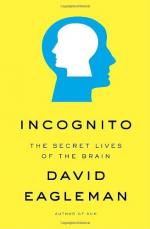
|
| Name: _________________________ | Period: ___________________ |
This test consists of 5 multiple choice questions, 5 short answer questions, and 10 short essay questions.
Multiple Choice Questions
1. What happens when a rat is presented with a similar dilemma as the one in question 129?
(a) It often lies down and dies.
(b) It often runs around in a circle.
(c) It gnaws on its leg.
(d) It is incapable of any action.
2. How does Eagleman explain the phenomenon as to how men made their choices in the experiment?
(a) Men are attracted to women who have the same ethnic looks as themselves.
(b) It goes back to the early history of humankind.
(c) It is socially ingrained from advertisements.
(d) The cars that men chose were the ones that had the most attractive women standing by them.
3. What problem does Eagleman describe in illustrating how the mind may be divided?
(a) An early problem in the development of artificial intelligence.
(b) The problem of longitude.
(c) Counting recurring numbers without missing one.
(d) When developing the polygraph, how to distinguish between saying one thing and expressing something different with body language.
4. How did Whitman die?
(a) Falls out of a tower.
(b) Lightening.
(c) Electrical shock.
(d) Shot by the police.
5. What is hard wired into our brains?
(a) Only the survival instinct.
(b) Things such as breathing and digestion.
(c) Much of what motivates us and drives our behavior.
(d) Nothing is actually hard wired into our brains.
Short Answer Questions
1. What is the significant fact in the two showings to the men?
2. What does the logic puzzle that Eagleman challenges readers with involve?
3. At what do babies tend to look?
4. What does Eagleton point out in the beginning of the chapter about our senses?
5. How do some scientist define intelligence?
Short Essay Questions
1. Who is Charles Whitman and what did he do and what may have contributed to his actions?
2. What example does Eagleman cite to demonstrate the difference between the rational and emotional mind?
3. How does Eagleman see many of the small sub-routines of the mind and what example does he give?
4. Explain the physical division in the brain and what can happen if the two hemispheres are severed.
5. What does Eagleman say about the abilities of a bloodhound?
6. To what part of the body are newborns drawn and what does this imply about human beings' predisposition?
7. What does Eagleman say about our ability to perceive light versus that of insects?
8. What incident does Eagleman discuss concerning Mel Gibson?
9. What does Eagleman suggest about our culpability in our actions, particularly males?
10. How does Eagleman use an example of early robotics to illustrate how the mind may be divided?
|
This section contains 1,107 words (approx. 4 pages at 300 words per page) |

|




